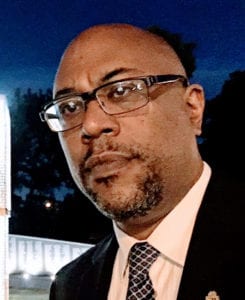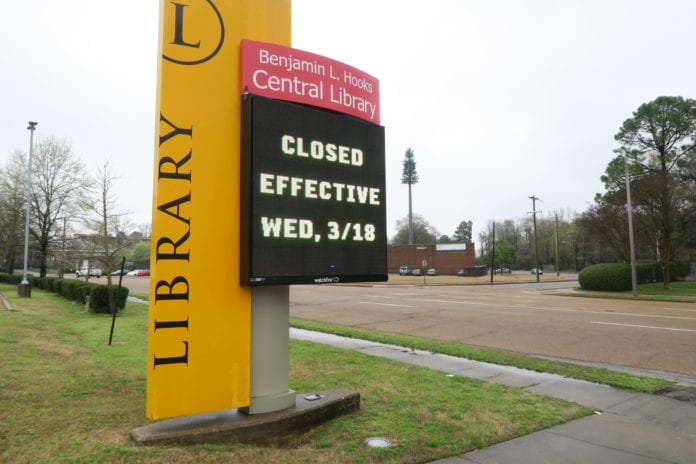Can’t go to work. Can’t go to a Grizzlies game or concert. Can’t go to a movie. Can’t even go to a library or museum.

Those would all be places where we could escape from the anxiety of the COVID-19 pandemic – to at least pretend that our way of life hasn’t permanently changed.
Church and other places of worship would be on that list too, probably at the top – it’s the only one that’s more than a diversion. People go to worship expecting someone to reassure them, tell them everything is going to be fine because it’s in God’s hands.
Believers can still hear that message on Sundays, but they ain’t gonna be inside the building when they do. More and more places of worship are practicing social distancing, telling their flocks to stay home and watch online.
Which brings us to this defining moment for spiritual leaders and their followers from every faith tradition and denomination: How do you bring people together to worship, fellowship and serve when you can’t physically bring people together?
That was the fundamental theme addressed Tuesday during a webinar hosted by Church Health.
Christian, Muslim and Jewish clergy gathered – some remotely via videoconference – to discuss everything from how to alleviate fear, how to maintain food ministries and services that the needy rely on, and the fiscal realities of having zero butts in seats on Sundays for God knows how long.
Of course, it started with a prayer – specifically Bishop David Talley of the Catholic Diocese of Memphis, in the spirit of religious unity, sharing a prayer from an Episcopal bishop.
“Lord God, may we who are merely inconvenienced remember those whose lives are at stake,” Talley prayed. “May we who have no risk factors remember those most vulnerable. May we who have the luxury of working from home remember those who must choose between preserving their health are making their rent.
“May we who have the flexibility to care for our children when our school closes remember those children who will go hungry with no school meals,” Talley continued. “May we who have to cancel our trips remember those who have no place to go. May we who are losing our margin money remember those who have no margin at all. May we who settle in for quarantine at home remember those who have no home.
“As fear grips our country, let us choose love…. Amen,” he concluded.
For as much reverence and respect we confer on our spiritual leaders, it can become easy to forget that they are human too – which is to say that underneath the appearance of unshakable faith, many are wrestling internally with murky questions about how to do their jobs.
Listening to them do it out loud among their peers was a rare peek behind the curtain.
“The biggest piece for us as clergy is wrestling with our theological beliefs about what is faith and what’s not faith,” said Dr. Stacy Spencer of New Direction Christian Church. “I hear a lot of pastors saying, ‘We just gotta have faith, God has us covered.’ But on the other side of that is the practicality of looking at science and faith integratively and seeing that the numbers are speaking to us – that we must take caution and tell our people to take cover.
“If we continue to do as we’ve been doing and meet and we’ve been meeting, the mortality curve will continue to spike,” Spencer said. “But if we stopped meeting, we can flatten that curve a lot sooner. So it took a paradigm shift for me to say that as a faith leader, I’m being more responsible for my people by not meeting.”
Citing stark data from St. Jude Children’s Research Hospital, Rabbi Micah Greenstein of Temple Israel said they were among the first to shut down worship services.
“Whether we’re Muslim, Christian or Jew, the saving of human life takes precedence over everything else,” he said. “We have some of the leading infectious disease (experts) … and the data shows that one-third to one-half of the entire population will be infected with this.
“I think the single most dangerous disservice we can do as faith leaders is to say that it’s going to be okay,” Greenstein added.
Rev. J. Lawrence Turner of Mississippi Boulevard Christian Church delivered his Sunday message to a mostly empty sanctuary last Sunday, but the Facebook livestream had more than 8,000 views. Given how much pastors feed off of the energy of a live audience, he had other church leaders in pews to help simulate the energy of a full house.
“Preach with as much passion as you would if the sanctuary was filled with people,” he said. “And if you have a worship team, let them minister as normal.”
“People watching online, they must feel like they’re there to stay engaged,” added Bishop Linwood Dillard. “So we stay interactive, we’re talking about taking prayer concerns on the feed. People can (post), ‘Please pray for such and such,’ and during the altar call you call that person’s name. . . they feel like you’re actually in the room with them.”
But what about the money? Every religious center relies on its membership’s financial gifts to continue its work – financial gifts that are dropped in a physical basket at a physical altar.
Online giving is certainly easier and more common than in years past, but will these places of worship be able to count on that?
“There is this tension of ‘Okay, we’re not meeting in the building. People are not coming,” Spencer said. “God, we got to trust you, that somehow we’re still going to be able to meet the needs of ministry and pay our bills.
“But the bottom line for me,” he added. “is that I believe that if we take care of the people, God will take care of us.”
Bishop Phoebe Roaf, who heads the Episcopal Diocese of West Tennessee, was scheduled to be in the room for the webinar, but teleconferenced in instead – with good reason. She attended a church event in Chattanooga in early March but later learned that despite having no symptoms, she had been near someone who later tested positive for COVID-19.
“It just sort of shows that all of us can be at risk and not even know it,” she said.
In this crisis, sometimes the religious practices themselves can put worshipers at risk. Muslims pray five times daily across eight mosques in Memphis, a ritual in which they kneel and prostrate themselves, putting their faces to the floor with no idea how many people have done the same – or what pathogens they are carrying.
The Memphis Islamic Center recently hosted a meeting that included three infectious disease doctors who laid out in elaborate detail the risks of continuing to keep mosques open for prayer.
“If somebody walks in, and he had the virus, and he walked out, but then somebody came later on and prayed in that same position . . . That’s it. It’s game over,” said Imam Anwar Arafat. “And the doctors explained that very clearly. And it was a hard decision.”
Then he quoted a verse from the Holy Qu’ran, indicating it’s better to preserve a single life than to preserve a house of worship.
“I understand during times of crisis, people try and find solace in prayer and go into the House of God,” Arafat added. “But we also have to make sure people turn their own homes into places of worship.”




